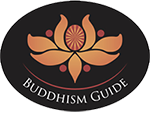I strongly believe that if we want to follow Gautama Buddha’s teachings we need to find ourselves a good teacher. Someone who not only has experience of what he or she is teaching, but also does the practice. In other words, they should practice what they preach.
But what do we need the teacher for? I think we need them to guide, mentor and support us along our chosen path. They should pass on there knowledge and understanding, and be there for us when we run into obstacles. Gautama Buddha placed great emphasis on personal experience, so I see the teachers role as a ‘helping hand’ along the way, and someone who helps us make sense of our own experiences and not tell us what we should be experiencing.
The key to a good teacher/student relationship is that we learn from them, but not get attached to them. A lot of teachers want exclusive rights over their students, but I personally think It is fine to have more than one teacher at a time, and it is also fine to move on once we have learnt what we can from them – we can always go back and get advice if we hit an obstacle.
If we see the teacher as a guide, mentor or spiritual friend, we are not going to get into problems of attachment or let ourselves be abused by them. However, if we see the teacher as a higher being, a precious one or some kind of guru figure, we are leaving ourselves open to all sorts of manipulation. When we see the teacher in that way we are not there to learn from them, but to lean on them. We are using them as a mental crutch and abdicating our responsibilities. Wisdom and compassion, the two wings of Buddhism, cannot be found in this way.
Some people think their teacher has all the answers, they can see and hear everything and they have special powers whereby they can magically tell the future, walk through walls or fly in the air. These are all projections and not based on any kind of reality.
If you see your teacher in that way you should ask yourself these questions, ‘What do I need a Teacher for?’ ‘Is it to learn from them or lean on them?’ ‘Am I looking for a way to reduce my suffering or just some sort of magical trip?’
The most important aspect of Buddhism, I believe, is that it is an inner journey. A journey of discovery about what makes us who we are, why we act in a certain way and how we can reduce the suffering in our life. For me it is not about mythical figures or realms, I see those as the outside world. It is about trying to make myself the best possible person I can in this life, and that is why I need a teacher, or teachers, to help me explore my inner world. I don’t want to lean on them, I have my friends for that, I want to learn from them.
What do you need a teacher for? Are you a learner or a leaner?
See also www.buddhismguide.org/respect

I’ve giving the thought of having a teacher a great amount of time and fill it is sound advice. There is only so much one can gain by reading books. I’ve read many many books and learned a great deal but that can only take one so far. I do have some difficulty with putting this teacher/student relationship into practice. How does one go about finding a teacher when one, in my case, lives more than two hours from the nearest Buddhist center? I’ve been practicing for more than two years and as far as I can tell there are no other practicing Buddhists in my area. Can one have a meaningful relationship with a teacher through a distant correspondence?
Wayne, thank you for your comment. In this day and age I believe it is possible to have a good relationship with a teacher through distant correspondence. We now have use of email, facebook, twitter and skye, which make it easier to get in touch with a teacher. I keep in touch with many of my students through email and you are very welcome to send me any questions you have. My email is [email protected]
Thank you once again for your comment.
Yeshe
Hi Yeshe, I found your blog through Reddit. Thanks for sharing your essay. I am thinking about whether I want to make my home close to a teacher or teachers, or even if I can find a “right” teacher. It’s useful to consider the good qualities of a teacher, and how they might be useful (friendliness, guidance) and how not useful (to tell me what to do next).
Re. Wayne’s comment. Resources I’ve found for online teachers include Buddhist Geeks, and online courses from Spirit Rock.